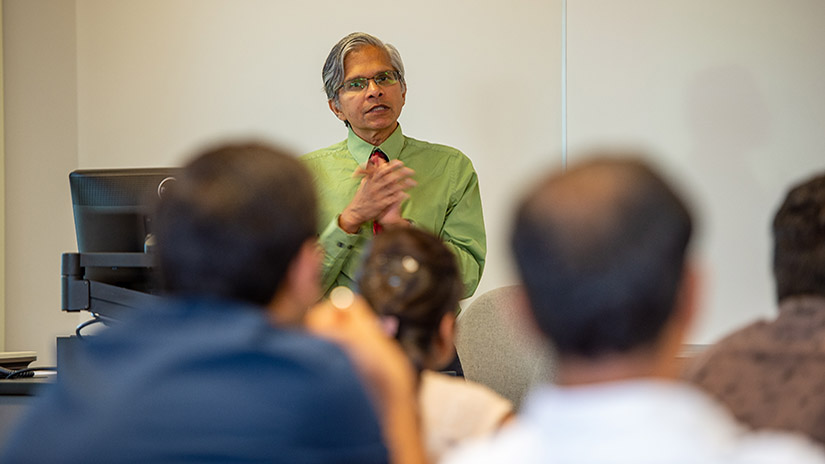UNIVERSITY OF WISCONSIN River Falls
Newsroom

Anthony Varghese, chair of the Computer, Information and Data Sciences Department at UW-River Falls, teaches a computer science class at the university. Varghese will instruct high school computer science teachers how to conduct research on that topic as part of a three-year program in conjunction with UW-Eau Claire and UW-Stout. The partnership is made possible by a $550,786 National Science Foundation grant. UWRF file photo
UW-River Falls, others partner to receive National Science Foundation grant
Three-year, $550,786 grant will be used to bolster computer science education, boost region’s economy
Dec. 23, 2024 - High school students in western Wisconsin and eastern Minnesota will learn the latest advancements in computer science, thanks to a $550,786 National Science Foundation grant received by the University of Wisconsin-River Falls and two partner universities.
UWRF partnered with the University of Wisconsin-Eau Claire and the University of Wisconsin-Stout to successfully qualify for grant funding. The grant dollars will enable the three universities to train high school teachers in the St. Croix Valley region to conduct research in computer science and develop materials to teach the subject, boosting the region’s future economy in the process.
The effort will build on existing partnerships between area high schools and the three universities to provide students with research-based practices in their computer science curriculum. The work is designed “to enhance the lives of the local population,” said Merry Mclaird, director of grants and research at UWRF.
“The objective of this project is to provide transformative opportunities to 30 in-service teachers delivering computer science education to high school students in this region by forming a network of teachers, students and college campuses,” Mclaird said.
Grant funding will allow the consortium to provide training to high school teachers for the next three summers. Teachers will spend four weeks at either UWRF or UW-Eau Claire to learn computer science research from faculty at the schools. They will then spend three weeks at UW-Stout to develop curriculum models and conduct educational research.
The project aims to expand the number of qualified computer science teachers in western Wisconsin and eastern Minnesota. It will also expand computer science research in those communities by providing high school students with improved data analysis skills. When those students get jobs in the region, they will add to the region’s computer science workforce.
“This project will bring computer science research to the communities in this region, providing high school students with enhanced data analysis skills going to work in local communities,” Mclaird said. “Each cohort of teachers who transfer their research experience back to their schools and their communities will yield hundreds of high school students capable of thinking more deeply about the relevance of computer science in their local community.”
The National Science Foundation awards grants worldwide to investigators working in the sciences. UWRF and its partners were competing with universities across the U.S. – most of them major research institutions – to obtain the computer science education grant.
“The fact that we received the grant from the National Science Foundation is significant since it can burnish UWRF's reputation locally and nationally,” said Anthony Varghese, chair of the Computer, Information and Data Sciences Department at UWRF. “The teachers who will participate can add this to their list of accomplishments as well.”
Varghese will train educators in computer science research at UWRF and Rahul Gomes, who teaches computer science at UW-Eau Claire, will do the same at UWEC. Katrina Rothrock, assistant professor of mathematics at UWEC, and Abhimanyu Ghosh, an assistant professor in engineering and technology at UW-Stout, will lead the three-week session at Stout where teachers will learn how to conduct educational research and implement it into their curriculum.
Provost Wes Chapin praised the collaboration and views it as “a great opportunity” for UWRF to work with other universities and high schools, building community connections in the process.
“The disciplinary field of computer science is growing and provides critical education and skills that will help prepare high school students for a future that is increasingly being defined by technology,” he said. “It will also help prepare them to be successful if they continue their education beyond high school or as they serve the people of this region as part of the workforce.”










